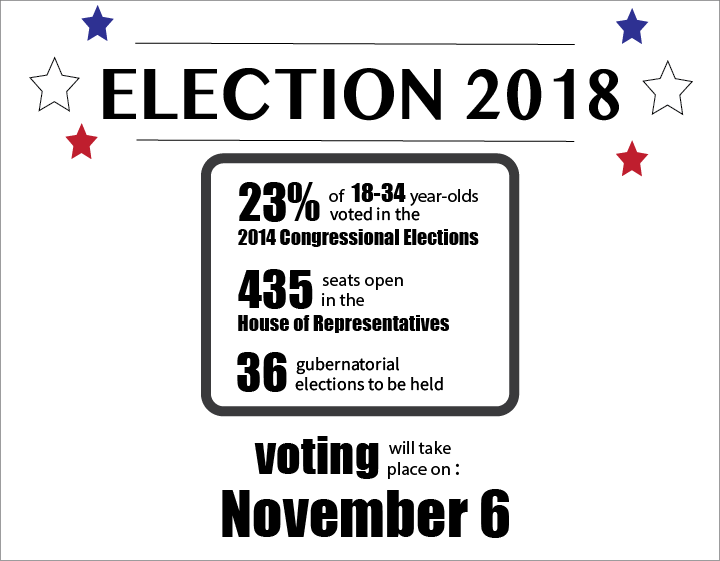Push for voter engagement on campus
Across the U.S., 35 Senate seats are up for election on Nov. 6. If the Republican party gains eight seats this November, reaching a total of 60 in the Senate, it would leave the Democrats unable to filibuster potential legislature.
With temperatures still hovering in and around ninety degrees, midterm elections seem far off. Regardless, news and media coverage around this year’s elections reflect a growing realization of the ability this particular November could have in politically shaping the next two years in the U.S.
Along with the 36 gubernatorial elections to be held in 2018 and the entirety of the 435 seats in the House of Representatives to be decided on Nov. 6, midterm elections could mean major shifts to the political landscape for the next two years.
For voters who are unhappy with the decisions being made in Washington since the 2016 elections, this comes as a welcome opportunity for change.
“I don’t think we are a super politically involved campus in general,” Meghan Quinlan ’19 said. “When it gets closer to the election, I’ll probably start paying attention but for now it’s not on my radar.”

Lack of political involvement in college-aged citizens is not unique to St. Joe’s or even the Philadelphia area. According to a census study, only around 23 percent of 18-34 year-olds voted in the 2014 Congressional Elections.
Some students, who understand the impacts the results of this election could have on the country, seek to bring awareness and encourage engagement among young citizens, particularly their peers on campus.
One vessel St. Joe’s community members are using to do this is POWER U, a Philadelphia interfaith coalition of four universities, LaSalle, Cabrini, St. Joe’s and Villanova, that focuses on different social justice issues including climate change and educational equity.
This fall, they are taking special interest in voter engagement efforts.
“I think a lot of people are unaware of the fact that there are midterm elections to begin with and are also unaware of their importance,” said Katie Sellar ’21, a student leader for the St. Joe’s branch of the organization. “I think these elections hold so much more value than people who are just ‘casual citizens’ pay attention to. It can seem like it doesn’t matter when really it affects every one of us.”
Susan Clampet-Lundquist, Ph.D., associate professor of sociology and a campus facilitator for POWER U, sees reason to be hopeful that along with student awareness will come engagement.
“In order to try to facilitate change, we need to have the right people in office,” Clampet-Lundquist said. “I feel really optimistic though because once St. Joe’s students, who maybe don’t know a lot about these issues, learn about them, they tend to become really passionate about it.”















































